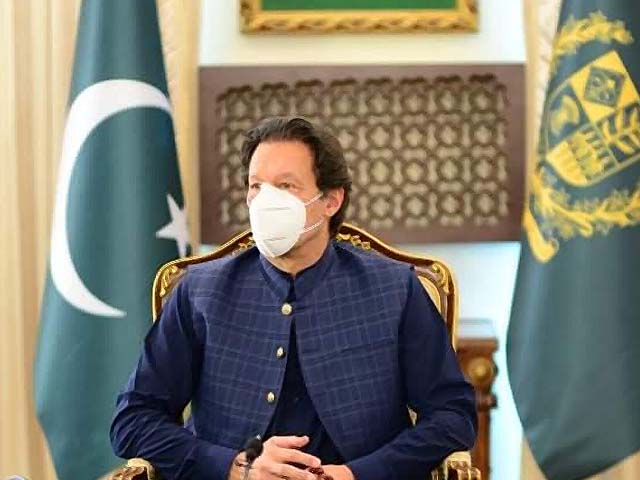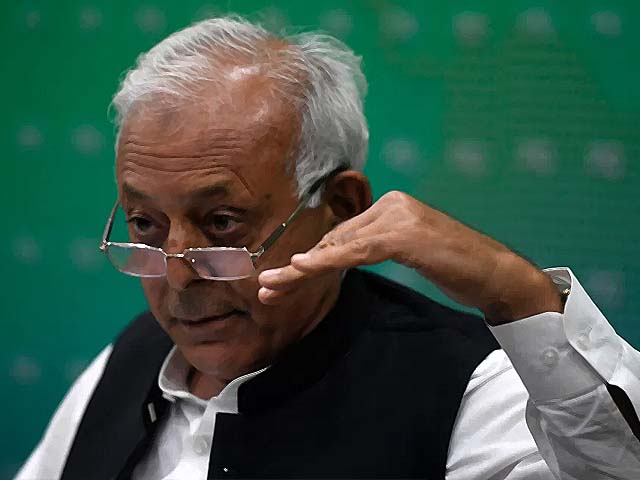
Nawaz Shairf in a conversation with his brother Shehbaz Sharif. PHOTO: REUTERS/ FILE
NAB’s 'selective accountability' is only adding fuel to PML-N’s ‘victimised’ fire
One has to consider the timing of the arrests, which are always carried out before an election is to take place.
Shehbaz Sharif’s arrest by the National Accountability Bureau (NAB) right before the by-elections raised legitimate concerns in the opposition regarding the impartiality of the accountability institution. Currently, the leader of the opposition and president of the Pakistan Muslim League-Nawaz (PML-N), Shehbaz has been charged with misusing his former authority as chief minister of Punjab and for his alleged involvement in the Ashiyana housing scam.
While he is currently under investigation by NAB, a perception has been created in the country that the PML-N is seemingly being targeted and punished for crimes other parties and politicians are exempted from. The spin wizards from the PML-N are of course using the past witch-hunts conducted during Pervez Musharraf’s regime in their favour, but the question still remains as to why NAB is not speeding up similar investigations against influential men such as Aleem Khan, Pervez Khattak, Zulfi Bukhari and other stalwarts of the ruling Pakistan Tehreek-e-Insaf (PTI).
Additionally, NAB’s failure in defending the charges against Nawaz Sharif and Maryam Nawaz, which earlier sent them to prison, is also raising questions regarding its ability to conduct an impartial investigation based on solid proof, as well as questions over the ability of its team of prosecutors.
Then there is the double standard when it comes to the frequency and speed of the proceedings against PML-N stalwarts. The most important one of them all is the timing of the arrests, which are always carried out before an election is to take place. After all, NAB could just as well have arrested Shehbaz after the by-polls, which would have also ensured more political stability in what is already a turbulent political climate. His arrest just before the by-polls only gave the impression that PML-N was once again denied a level playing field for the elections.
This perception of victimisation that has been created only works in favour of the PML-N, for just as Imran has his cult, so does Nawaz in the province of Punjab. The more NAB focuses on the PML-N, the more their supporters will believe this is indeed a targeted drive to disintegrate the party and a punishment for not adhering to the powers that be. This only strengthens the narrative that not only was Nawaz unfairly disqualified and imprisoned, but that the General Elections were also rigged to ensure their disenfranchisement.
The results of the by-polls in Punjab corroborate this, for these elections usually favour the ruling party, which they did not this time. The PML-N fought the by-elections without its leadership, as Nawaz and Maryam both opted to stay away from political activities while Shehbaz was under NAB’s custody. And yet the party managed to grab seats in Punjab that it lost in the General Elections. This makes it evident that irrespective of whether NAB’s investigations are motivated by accountability or not, Punjab’s populace is responding to the narrative of victimisation. And like it or not, politics is all about perception. After all, Imran managed to win the centre because of the perception that his party was going to win.
This is a classic Bernaysian approach of playing with the subconscious mind of the people to gain desired results. Edward Bernays, the inventor of modern propaganda, believed that human minds and desires could be manipulated, and that regimes could be created and destroyed by manufacturing public opinion and consent. This has been witnessed several times in Pakistan’s history, particularly by dictators to undermine political opponents. It started with Ayub Khan’s martial law when he took charge of the country on the promise of holding all corrupt politicians accountable, which of course never happened. General Ziaul Haq’s accountability drive was also focused on undermining opponents alone. Then came the era of the 90s, where both PML-N and the Pakistan Peoples Party (PPP) accused each other of corruption and used the slogan of accountability to settle scores with each other. Nawaz went to the extent of forming an Ehtesab commission to recover money from the corrupt, which was obviously a stunt to dent his opponents.
When Musharraf gave birth to the NAB in the name of across-the-board accountability, he too only focused on booking opponents from the PML-N and PPP through NAB. Only after the charter of democracy between the PPP and PML-N took place did things settle down for a while, and this accountability rhetoric gradually vanished from the political horizon.
However, the rise of the PTI, particularly after the 2013 Elections, once again gave birth to this sloganeering. Whether or not Imran is serious about accountability is a question only time will answer. Nonetheless, the revival of this rhetoric has set the tone of the current political climate, and it is now back in vogue. But accountability can only yield a result if everyone is brought to justice, instead of the cherry picking being witnessed at the moment.
NAB continues to be selective, evidenced by its suspicious past. After all, the charges brought up against the PPP during Musharraf’s era were never investigated during their tenure from 2008 to 2013. Consequently, NAB needs to show its impartiality by increasing the pace of pending inquiries against politicians belonging to other parties. Who will bring them to justice? Further, why is Punjab the only province being focused upon? What about seriously investigating former Khyber Pakhtunkhwa Chief Minister Khattak for the delay in the bus rapid transit (BRT) project, or for his misuse of authority? What about the billions of rupees laundered by PPP stalwarts? Till May of this year, NAB was probing around 500 cases of corruption in Sindh, including the inquiry against Murad Ali Shah and Agha Siraj Durrani, and yet there is no hurry to progress these pending cases.
All this only adds fuel to the fire being set by the Sharif family as they convince their vote bank that like all previous accountability campaigns, this one too is focused only on undermining political opponents of the current regime and its architects.
None of this is to imply that NAB should stop its investigations against the Sharif family, but it must balance this campaign by also concluding pending inquiries against other politicians accused of similar or greater charges. If that is not done, we will only witness the revival of the political culture of the 90s, where the only purpose of accountability institutions was for political parties to malign each other.




COMMENTS
Comments are moderated and generally will be posted if they are on-topic and not abusive.
For more information, please see our Comments FAQ